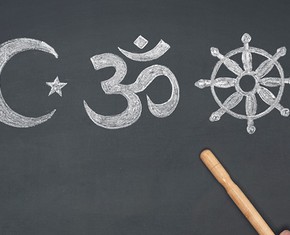The views expressed in our content reflect individual perspectives and do not represent the authoritative views of the Baha'i Faith.
During the past two centuries, humankind has tried several theories, various kinds of “isms,” to organize our lives and our governments. They haven’t worked well for everyone.
Shoghi Effendi, the Guardian of the Baha’i Faith, roundly condemned those various theoretical “isms:”
The chief idols in the desecrated temple of mankind are none other than the triple gods of Nationalism, Racialism and Communism, at whose altars governments and peoples, whether democratic or totalitarian, at peace or at war, of the East or of the West, Christian or Islamic, are, in various forms and in different degrees, now worshiping. Their high priests are the politicians and the worldly-wise, the so-called sages of the age; their sacrifice, the flesh and blood of the slaughtered multitudes; their incantations outworn shibboleths and insidious and irreverent formulas; their incense, the smoke of anguish that ascends from the lacerated hearts of the bereaved, the maimed, and the homeless. – The Promised Day is Come, p. 113.
So let’s look at a few of the methods—the “isms”—that humanity has tried to bring order to human civilization since the middle of the 19th Century.
Communism
There was a time, starting about 1840 and lasting up until about 1940, when communism had an appeal to many people. But that was before Stalin, before Khrushchev, before Mao, before Ceausescu, before Pol Pot, and before Kim IL-sung. It turns out that most people don’t like brutal dictators, economic stagnation, and a censored press, and most people believe that all human beings should be able to direct their own lives and benefit from their own efforts.
Most also believe that human nature aspires toward the divine. Most of us believe in transcendence. We want to be more than animals, we want to do good, to live harmoniously and love others and build an ever-better and just society.
Capitalism
About the same time as many fell in love with communism, capitalism and free-markets began to rise as the proposed remedy to all ills. The right of individuals to own assets and to make profits from those assets is often conducive to collective prosperity. But as commonly practiced today, capitalism maximizes profits for owners, and social order and the quality of community life can become distant secondary concerns. This type of unchecked capitalism leads to growing inequality and disparity, and to a type of economic enslavement, as capital is used to influence and bend laws to accommodate the desires of capital owners.
As to free markets, they are hardly free when people of means manipulate them through media and legislation, when they buy out or take over competitors to avoid competition, or force competitors out of business by artificial pricing, whether high or low. Thus, we see in Western capitalism that the rich and powerful very quickly come to dominate others. In fact, over time unchecked capitalism bends toward oligarchy, and we can see that force operating in many countries today—because capitalism, by itself, is not a moral system; it’s just about profit making. When people think primarily about short-term profits, their short-term thinking does not take into consideration the damage we may do to people to achieve it, to our planet and to our children’s futures.
Racialism
Shoghi Effendi applied his most severe condemnation to those who seek to exalt one race over another:
The theories and policies, so unsound, so pernicious, which deify the state and exalt the nation above mankind, which seek to subordinate the sister races of the world to one single race, which discriminate between the black and the white, and which tolerate the dominance of one privileged class over all others—these are the dark, the false, and crooked doctrines for which any man or people who believes in them, or acts upon them, must, sooner or later, incur the wrath and chastisement of God. – Ibid., pp. 113-114.
Libertarianism
So, we’ve all learned with this “ism,” that the absolutely unrestrained freedom of libertarianism is clearly a bad idea. There are reasons we have laws, moral codes and social injunctions. We need to have lines on the street and stop signs and lights at intersections. Beyond that we need common agreement about what constitutes acceptable behavior. Society does not function well when people are free to do whatever they want, because the powerful take advantage of the less powerful and lawlessness and moral laxity soon leads to licentiousness, depravity, and absolute spiritual poverty.
Nationalism
Then there’s nationalism, a popular and populist message these days. While borders need to be managed, walling ourselves off from each other and treating each other as if we are all different really won’t bring about a greater peace and unity. Of course, we’ve seen where extreme nationalism leads. Recall that the word “Nazi” is short for “national” and that their goal was to eliminate or dominate everyone who was not Aryan.
So, we’ve tried many things since the new age began about 175 years ago, but none of them have worked optimally. What should we try next?
Not the old religions—religions are always context-specific. They have similar eternal principles, morals and the like, but with the passage of time, their social teachings become limited and outdated.
… the teachings of religion must be reformed and renewed because past teachings are not suitable for the present time. For example, the sciences of bygone centuries are not adequate for the present because sciences have undergone reform. The industrialism of the past will not ensure present efficiency because industrialism has advanced. The laws of the past are being superseded because they are not applicable to this time. All material conditions pertaining to the world of humanity have undergone reform, have achieved development, and the institutes of the past are not to be compared with those of this age. – Abdu’l-Baha, The Promulgation of Universal Peace, p. 378.
For a moment, then, let’s consider the Baha’i solution, which holds that about 175 years ago, we entered a new age.
An analogy can help us understand the nature of this age: It’s like we’ve all been fish swimming in rivers in different parts of the world until the middle of the 19th Century, when two things happened—the rivers found their way to the sea, and the storms feeding these rivers greatly increased, pushing us all along.
The sea is, of course, beautiful, but it’s also bewildering and frightening if you’ve been a river fish.
So here we are in the sea, seeing all sorts of things we’ve never seen in our native rivers, and as this is uncomfortable for some, we see many people trying to swim back up the river, wanting to go backwards in time, to reestablish boundaries and to be protected from foreignness.
This won’t work. No one can stop the river from running to the sea—it’s the river’s destiny.
So here we are. We need now to learn how to live in this new world of ours, filled with diversity and possibility, all now just as close as next door. We need to understand the nature of our age—that it’s part of God’s plan to bring us together and that we must learn new ways as well as keep the old ways that make sense.
It’s not just that we must live with diversity. It’s not just that we must coexist—as a popular bumper sticker says; it’s that we must unite, work together as one, valuing our diversity as necessary and beautiful, making a whole that’s better than its parts. That’s the meaning of what Baha’is call the oneness of humanity.
Can you imagine what a powerful force it will be when members of different religions discover that they have a common fulfillment? It’s not that there are different Gods for different religions, there is only one God and one plan. That’s the meaning of what Baha’is call the oneness of Religion.
We are now, the Baha’i writings say, at the beginning of the coming of age of the human race. We are at the transition from adolescence to adulthood, and the beginning of the consummation of human evolution. A large portion of the Baha’i Writings confirm, of course, the ancient moral guideposts that religions always provide. It requires us to act with “justice, equity, truthfulness, honesty, fair-mindedness, reliability, and trustworthiness.” Therefore, we provide education to children and adults of all faiths to help refresh our memory about these guidelines.
That’s why the Baha’i Faith:
… concerns itself primarily with the nature of those essential relationships that must bind all states and nations as members of one family. – Shoghi Effendi, The World Order of Baha’u’llah, p. 43.
Our task is to provide the world with a template for living together in justice, in peace and in prosperity. To do that both locally and globally, you can join and participate in the Baha’i community. Once you do that, you can tell people what age we now live in: We’re in the age of oneness, the great and promised age of all people and religions coming together.
















Comments
Sign in or create an account
Continue with Googleor